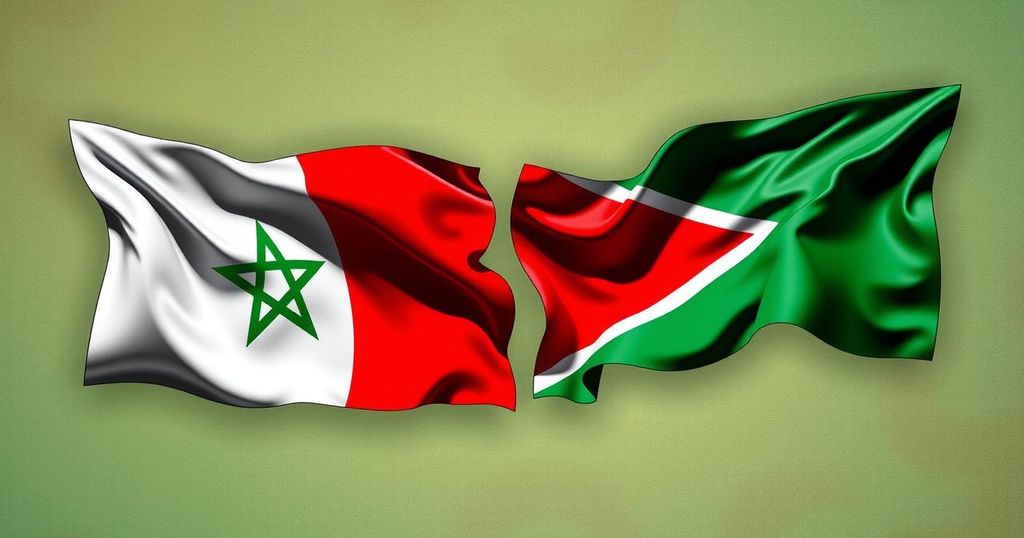Morocco and Mauritania’s strategic relationship is integral to the Maghreb region, especially amid the Western Sahara conflict. Recent diplomatic engagements indicate a commitment to enhancing ties across security, economy, and culture. Their cooperation aims to address pressing regional issues through collaborative initiatives, showcasing a mutual goal of stability and prosperity. This partnership represents a promising model for African cooperation and development.
The strategic relationship between Morocco and Mauritania has emerged as a vital factor in the Maghreb region, particularly in the context of the Western Sahara conflict. Given its geographical position, Mauritania plays a critical role in regional diplomacy and peace efforts, especially amid tensions instigated by Algeria. Recent developments, such as the meeting between King Mohammed VI of Morocco and President Mohamed Ould Ghazouani of Mauritania, signify a renewed commitment to strengthening bilateral ties, which encompass various dimensions including security, economic growth, and cultural understanding.
Historically, Moroccan-Mauritanian relations have evolved through shared interests in stability, security, and development, forged within a context of ongoing geopolitical challenges. The two nations have established a robust partnership that extends across cultural, political, and economic dimensions, driven by mutual goals and historical ties. They find themselves at the forefront of critical regional security issues, facing threats from terrorism, organized crime, and illegal migration, necessitating collaborative efforts to ensure regional stability.
Mauritania’s position is particularly complex, bordered by the Sahara to the north and influenced by Algeria’s strategic moves. The nation strives to maintain a neutral stance concerning the Western Sahara dispute but actively participates in regional initiatives aimed at economic revitalization, like the Nigeria-to-Europe gas pipeline project. These collaborations reflect a commitment to fostering a new political and economic climate, while also addressing security challenges, particularly at key trade nodes like the Guerguerat crossing.
The overarching essence of Moroccan-Mauritanian ties is underscored by a shared vision for regional integration and sustainable development. Morocco’s initiative to develop its southern provinces illustrates a forward-looking approach that positions them as an economic corridor between Africa and Europe. This includes significant projects such as the Atlantic port of Dakhla, which enhances maritime connectivity and trade potential, providing mutual benefits to both countries through increased access to global markets.
Moreover, the collaboration transcends mere economic engagement, aiming for a comprehensive partnership in security and stability. This includes cooperative measures on critical challenges such as arms trafficking and transnational terrorism, enhancing both nations’ defense capabilities and resilience against crises. Emphasizing shared military training and expertise fosters a united front against common threats, establishing a stronger regional security framework.
In light of these developments, Morocco and Mauritania exemplify a partnership model that prioritizes strategic cooperation while addressing pressing regional issues. Initiatives like the Atlantic Gas Pipeline symbolize the potential for collaborative efforts to reshape the geopolitical landscape of North Africa through shared prosperity and stability. With the leadership of King Mohammed VI, this relationship has prospects for setting benchmarks for future African cooperation, embodying principles of integration and mutual benefit.
Concluding, the depth of historical and cultural ties between Morocco and Mauritania warrants a concerted effort towards fostering a flexible political framework. The realization of their strategic partnership depends on establishing a robust economic foundation that supports sustainability and shared interests. By developing critical infrastructure and remaining committed to collective projects, both nations can significantly influence the North African geopolitical landscape, turning it into a beacon of prosperity and integration in Africa.
The geopolitical dynamics in the Maghreb region are significantly influenced by the strategic relations between Morocco and Mauritania. With the ongoing conflict concerning Western Sahara, Mauritania’s role has become increasingly vital, serving as a mediator while balancing its relationships with Algeria and Morocco. The historical ties between these nations, coupled with their geographic proximity, have laid the foundation for a partnership centered around regional security, economic development, and cultural exchange, making their collaboration crucial in tackling contemporary challenges.
This strategic relationship between Morocco and Mauritania underscores the importance of a collaborative approach to regional challenges. Through their historical ties and shared interests, both nations are positioned to lead initiatives for stability and development in North Africa. By embracing a flexible political framework and focusing on comprehensive economic projects, Morocco and Mauritania can navigate future challenges effectively, fostering a prosperous and integrated regional landscape that serves as a model for cooperation in Africa.
Original Source: moderndiplomacy.eu






